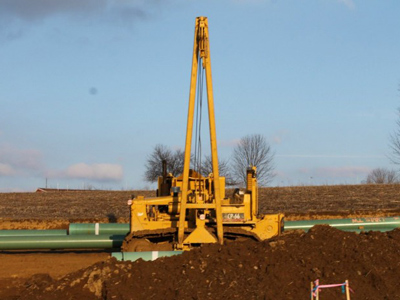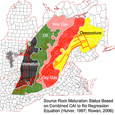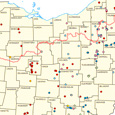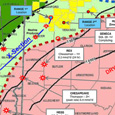Study claims pipelines will benefit agriculture economically
Wednesday, November 25, 2015

SALEM, Ohio — A study released Nov. 19 states that agriculture will reap benefits from the construction of natural gas pipelines in Ohio. The Ohio State Grange commissioned a study by Hillsdale College.
Agriculture and pipelines
The study examined the relationship between agriculture and access to affordable natural gas supplies in Ohio and Michigan. Hillsdale College Professors Dr. Gary Wolfram and Dr. Charles Steele looked at two aspects of the underground pipeline projects including the long-term safety and the benefits the pipelines will deliver to farmers.
“Natural gas is a major component of farming operations and expenses. Building new natural gas infrastructure can reduce costs for farmers by increasing access to affordable natural gas,” said Wolfram in a conference call.
Controlling costs
Wolfram said farmers can no longer rely on high grain prices, so they must control production costs and lower expenses. He said one way to find savings is to expand the use of natural gas since energy accounts for more than 30 percent of a farm’s costs.
Energy costs
Steele said natural gas has many direct benefits for farmers since it can be used to make electricity, fuel and grain drying. And with an abundance being available, it will mean lower energy prices. Another benefit will also mean lower input costs for fertilizer and benefits since natural gas is used to make them as well.
Wolfram said natural gas is a cheap and efficient energy source that has the potential to reduce energy costs, given it is less subject to price volatility and market risk than other energy sources.
Cheaper
He said transporting natural gas through pipelines is safer, cheaper and more efficient than transporting it via trucks and railcars, and helps to drive down the overall price.
Rupture
Wolfram said the big risk associated with natural gas pipeline development is the risk of rupture with the possibility of explosion and fire, but feels the risk is minimal and that is one big reason why they see so many benefits to agriculture.
FERC review
The Federal Energy Regulatory Commission is working to review the applications for natural gas pipelines projects that would cross Ohio including Stark and Wayne County.
Rover
FERC announced a schedule for the Rover pipeline project which would mean FERC issuing a final environmental impact statement on the pipeline in July 2016.
The Rover route spans approximately 710-miles originating in southeastern Ohio, western West Virginia, and southwestern Pennsylvania and continues north across the state of Ohio and into Michigan. The pipeline will transport 3.25 billion cubic feet per day of natural gas when completed.
Nexus
Nexus is also planning a natural gas pipeline to cross Ohio. The pipeline will begin at the Kensington, Ohio, natural gas plant and extend 250 miles. It will carry 1.5 billion cubic feet of gas a day into Michigan, Chicago and Ontario, Canada. FERC is reviewing its application currently.
Opposition
However, some officials for example in Wayne County have came out against the Rover pipeline project. Both county commissioners and the Wayne County Farm Bureau have stated their opposition because of concerns over what the construction process will due to farmland.
Adding value
But Bob White, president of the Ohio State Grange and a farmer in Hardin County, said in the conference call that he feels the pipelines will be beneficial to farmers. He said he has high-pressure gas pipelines on his property and wants to assure farmers that he has never had a problem with them. He said he has installed tile and used deep tillage without problems in farm fields.
Instead, White feels it increased the value in his property because he has natural gas available as his heat source for his home.





My father laid thousands of miles of line. A lot through VA. including South Hill, PA, NY etc. All through farm land. Those lines were laid in the 60s and still good. A smart pig tests the pipe integrity. Once a line is laid, thats it for years.
Maybe those Commissioners should let their farmers pay the price for foreign oil, see how long they farm then.